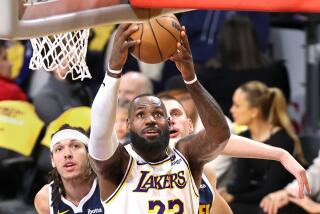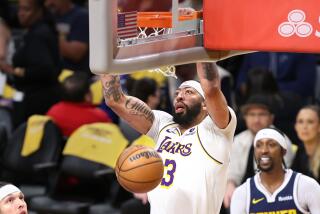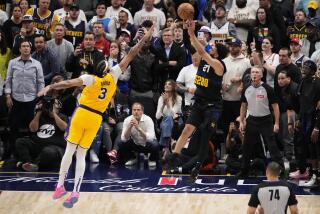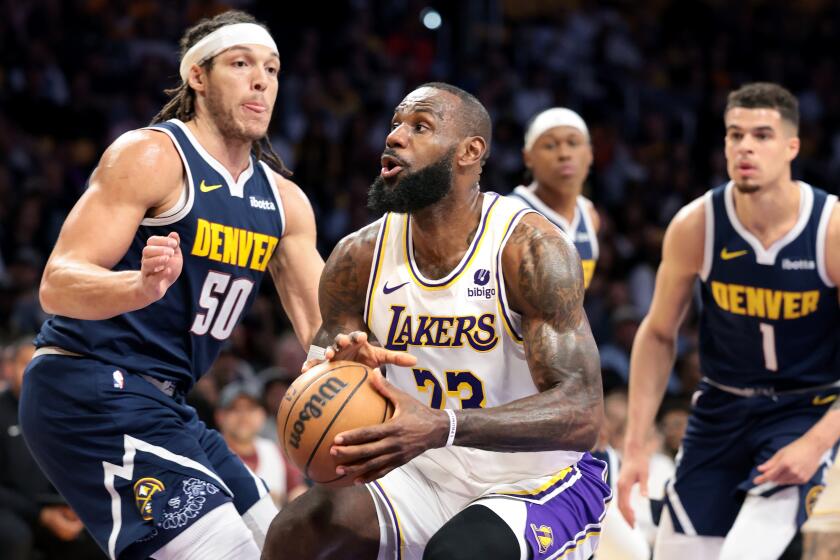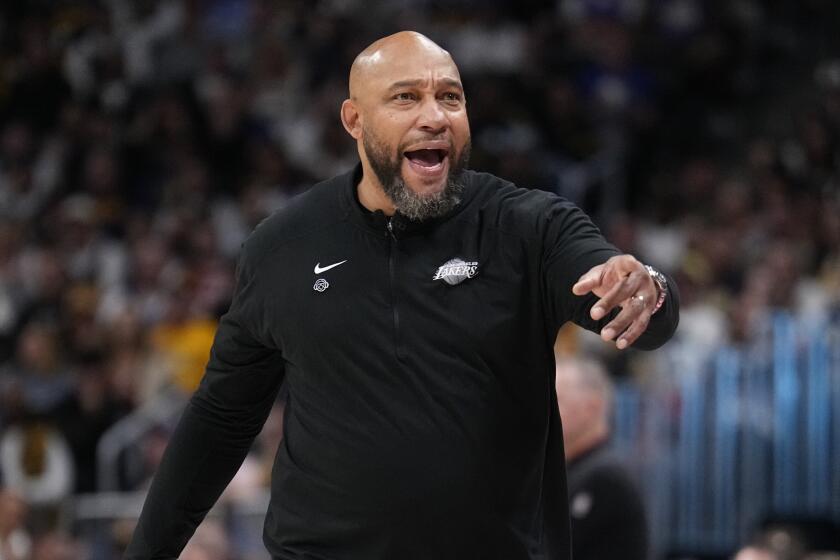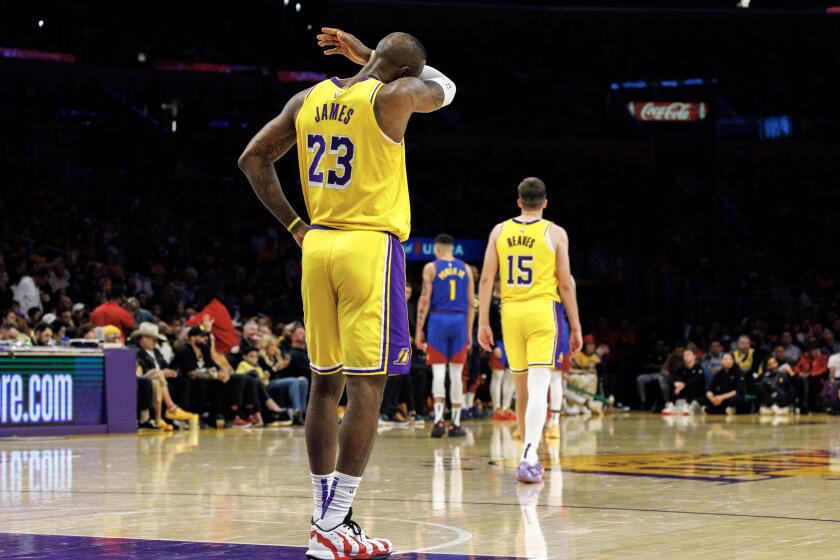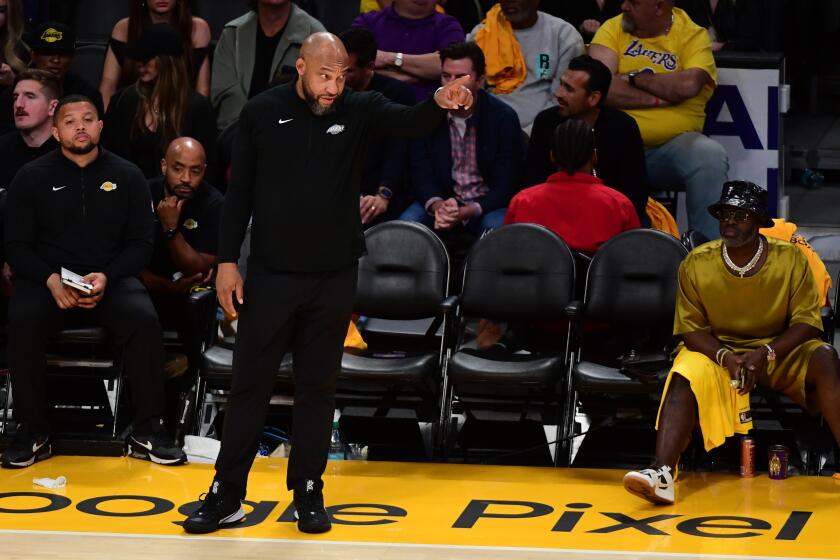Ron Artest did not shrink from psychotherapy
We’ve had champion athletes thank their mothers, their fathers, their teammates, their deities.
They’ve thanked their coaches, their team owners, their children, their wives. After the Lakers won their second consecutive championship recently, Ron Artest thanked his shrink.
Welcome to Los Angeles, Mr. Artest. At last, you are one of us.
So I finally track down Artest’s psychotherapist, the one who helped turn him from a source of fan frustration into Lakers hero. If Artest is a Cinderella story, Houston psychologist Santhi Periasamy is his fairy godmother.
Dr. Periasamy is a publicity-shy licensed psychologist with 14 years’ experience in private practice. She works with athletes, entertainers and regular folks like you and me on such issues as anxiety, depression, eating and body image concerns, anger management, career difficulties and substance abuse issues.
Though she has been dubbed a “sports psychologist,” she doesn’t specialize in that field but she does have enough experience with Artest and other athletes to understand the stresses they are under.
“Athletes are exposed to multiple layers of evaluation since [they] are often connected to ... part of a team,” she explains. “Unlike most people, athletes cannot afford to have a bad day because it may affect the success of the team, their contract for the upcoming year, one’s endorsements, and ultimately one’s livelihood.”
Periasamy will not talk specifically about Artest’s treatment, but she will freely discuss the difficulties athletes like him face — the giant expectations, the almost inevitable backlash — and about the difficulty in overcoming the stigma connected with seeking counseling in a man-up kind of culture.
“Most people are able to leave work and relax without the fear of negative publicity or judgment,” she says. “Athletes along with other public figures may not have the privilege to relax in the same way.”
Professional athletes aren’t noted — or even admired — for their vulnerability, and all but a relative few are reluctant to seek help. But Artest admitted in October that he’d begun seeing a psychologist back in his days with the Rockets. And Sports Illustrated recently did a smart article on the pressures professional baseball players face.
“ Major League Baseball, the country’s oldest professional team sport and a longtime fortress against psychiatry, has recently taken giant steps to openly acknowledge players with emotional problems and give them the time and resources to deal with those issues,” wrote Pablo S. Torre, in a June 21 article about the strides baseball is making on mental health.
Artest’s analyst admits that negative reactions to such treatment continue to exist, “But it seems that the general trend is for people to seek mental health support when a person has the desire to work toward a healthy life balance,” she says.
There is little question that as salaries and ticket prices rise, fan expectations become more intense. They are less understanding of failure and more likely to voice their outrage.
“It seems like most fans are compassionate and understanding,” Periasamy says, though the good doctor obviously has never visited Philadelphia or Oakland. “It seems like sometimes the public may forget that athletes also have families to support, a career to foster, financial stress, concerns about how she/he is perceived, the desire to be successful, etc.”
Artest, of course, faced his share of criticism throughout the season, before stepping up during the Finals, especially in Game 7. At times, fans would let out a group groan when Artest set up for a shot. Throughout his career, he received his fair share of boos, which come with the territory, though in Periasamy’s view they can be counterproductive.
“In my opinion, people generally respond more favorably toward positive feedback, and negative gestures such as booing can be hurtful,” she says. “I am not aware of any research supporting mass criticism as a motivator.”
(For the record, I’m all for “mass criticism as a motivator,” particularly when it comes to the Cubs or the Clippers.)
In the end, the flamboyant patient and the quiet doctor seem an odd fit. Artest has a history of conflict, including a particularly ugly incident where he went into the stands to confront fans while with the Indiana Pacers.
Meanwhile, his doctor, soft-spoken and modest, tags her correspondence with the Gandhi quote: “You must be the change you wish to see in the world.”
Together they helped give Los Angeles another championship, a coming of age for Artest that was accompanied by a very personal admission.
Good for him. Good for basketball. Good for all of us.
Lakers win! Buy championship merchandise here
Clicking on Green Links will take you to a third-party e-commerce site. These sites are not operated by the Los Angeles Times. The Times Editorial staff is not involved in any way with Green Links or with these third-party sites.
More to Read
All things Lakers, all the time.
Get all the Lakers news you need in Dan Woike's weekly newsletter.
You may occasionally receive promotional content from the Los Angeles Times.
